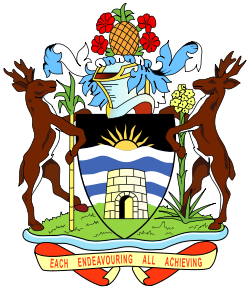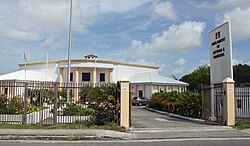Senate | |
|---|---|
| 16th legislature | |
 | |
| Type | |
| Type | |
Term limits | None |
| Established | 27 February 1967 |
| Leadership | |
Alincia Williams-Grant since 25 June 2014 | |
Philip Shoul since 5 March 2025 | |
| Structure | |
| Seats | 17 |
 | |
Political groups | Government Senators
Opposition Senators Independent Senators
|
Length of term | 5 years |
| Elections | |
| Appointment by the Governor-General | |
| Meeting place | |
 | |
| Website | |
| ab | |
 |
|---|
The Senate (Antiguan and Barbudan Creole : Senit) is the upper house of the Parliament of Antigua and Barbuda. The Senate and the lower chamber, the House of Representatives, together form the bicameral legislature of Antigua and Barbuda. The Senate and the House together may make laws for "the peace, order and good government of Antigua and Barbuda". [1] Any bill other than a money bill may be introduced in the Senate. [1]
Contents
The composition and powers of the Senate are established under sections 28 to 35 of the Constitution. The Senate is composed of seventeen members appointed by the Governor-General. [2] Ten members are appointed on the advice of the Prime Minister, four on the advice of the Leader of the Opposition, one on the advice of the Barbuda Council, one resident of Barbuda on the advice of the Prime Minister, and one at the Governor-General's discretion.
The current [update] President of the Senate is Senator the Hon. Alincia Williams-Grant. [3]